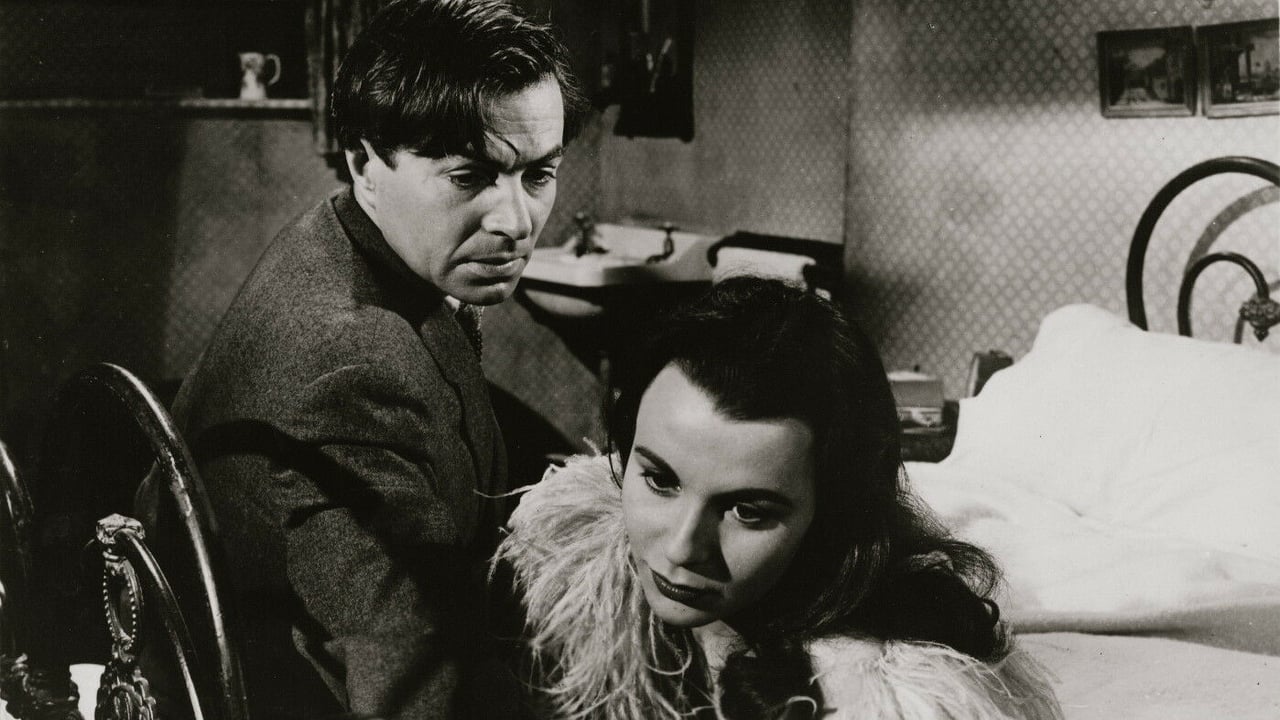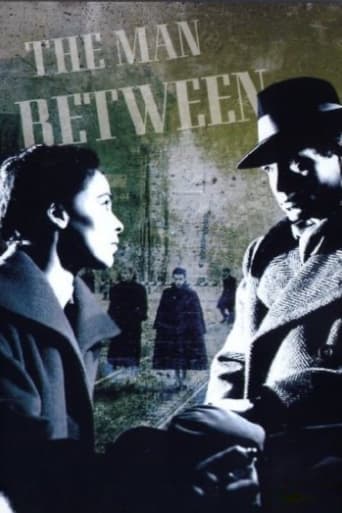SpuffyWeb
Sadly Over-hyped
Sameer Callahan
It really made me laugh, but for some moments I was tearing up because I could relate so much.
Casey Duggan
It’s sentimental, ridiculously long and only occasionally funny
Frances Chung
Through painfully honest and emotional moments, the movie becomes irresistibly relatable
mcannady1
I first saw this unique film not long ago and was not surprised that it was superb. Given James Mason's wonderful and heart-wrenching performance and the young and naive Claire Bloom's great love for his character Ivo Kern, the film had a great recipe for success -- To all of these wonderful elements I have to mention the wonderful talents of Carol Reed's superb film-making. The viewer is willingly drawn into each and every scene of the film. The soul-stirring music inter-twined with the recreation of the principals watching opera at leisure is soon found to be more deceptive than it appears to be.The young and lovely Susanne (Bloom) who is very naive arrives in war-torn Berlin to visit her brother Martin (Toome) who is in the Military and his lovely wife Bettina (Neff). From the very start Susanne begins to have a concern that her sister-in-law's appearance of anguish and worry may be an indication of her having a dangerous affair. The beautiful Bettina appears to be sorrowing in secret and there is a boy of 11 or 12 who cycles back and forth from the airport to Martin and Bettina's home. In the background we hear soul-stirring music. Later the music is inter-twined with opera music, but the tension level increases as it is soon evident that war-torn Berlin is enshrouded with danger.Susanne meets Ivo Kern who is soon revealed to have been Bettina's husband originally. He had been incorrectly reported dead; hence Martin's marriage to Bettina. Susanne begins to suspect that Ivo was Bettina's source of worry. Ivo had been a black-market lawyer and was planning to reform in recent years. When Ivo invites Susanne to go skating, Bettina appears concerned. This could be rightfully so, for some dangerous former or newly acquired alliances could prove perilous to him and his family and friends.Susanne and Bettina along with her brother Martin are drawn into a plot which endangers Bettina and Ivo. Susanne's naiveté may be a an endangerment to the principals, which also worries the young boy on the bicycle. In his cycles back and forth, he gathers information for which Ivo pays him. However, The boy is soon worried about his good friend Ivo which is evident by his constant cycling back and forth.We soon find that Susanne makes an irretrievable error along the way.The plot thickens when Susanne is mistaken for Bettina and is kidnapped. In helping to rescue Susanne, Ivo finds himself falling in love with her. Susanne returns his affection, but worries about new and frightening developments.... She had formerly mistrusted her new friend, but was now fearful for his safety.As the story builds to a perilous denouement, every scene is important; every character's actions adds to the heart-stopping suspense. To avoid a Spoiler approaching, I will stop here.My assessment of the story is an even 10 for cast, content, etc. Under Carol Reed's skillful direction the story is unforgettable.
ackstasis
Following the release of his masterpiece 'The Third Man (1949),' a refreshingly-offbeat amalgam of British noir and Ealing-style whimsy, director Carol Reed was heralded as one of the era's most promising filmmakers. Critical admirers anxiously awaited his follow-up effort, which was four years coming. Today, the consensus appears to regard 'The Man Between (1953)' as little but a pale imitation of 'The Third Man.' Certainly, the two films share similar scenarios, both involving a foreigner's espionage-tinged visit to a war-torn city (Vienna and Berlin, respectively) that has been divided by opposing powers. However, despite lacking Graham Greene's wry sense of humour, and particularly the boyish charisma of Orson Welles, Reed's follow-up picture is nonetheless an excellent drama, blending romance and tragedy with the director's usual flair for generating atmosphere and international intrigue. The fine chemistry between stars James Mason and Claire Bloom finds a life of its own amid the rubble-strewn ruins of a city still at war with itself.Young British woman Susanne Mallison (Claire Bloom, whom Chaplin had discovered the previous year for 'Limelight (1952)') arrives in Berlin to visit her brother (Geoffrey Toone), who has married German-born Bettina (Hildegard Knef). Through her sister-in-law, Susanne is introduced to the enigmatic Ivo Kern (James Mason), a professional kidnapper with ambiguous allegiances towards both the Eastern and Western powers. Screenwriter Harry Kurnitz had a talent for illustrating characters with hidden motives and concealed secrets (see 'Witness for the Prosecution (1957),' 'The Web (1947)' or either of his 'Thin Man' features), and his screenplay spends its first half ominously exploring the intentions of Bettina, whose association with Ivo implicitly suggests a family betrayal. Interestingly, the character is effectively abandoned in the film's second half, but to the film's advantage, as Susanne and Ivo are relentlessly hunted in the Eastern Bloc following a botched kidnapping. Here, Reed narrows his dramatic focus, but the doomed romance between Bloom's young idealist and Mason's war-weary criminal remains appropriately understated, inspiring empathy without stooping to melodrama.Despite the absence of Robert Krasker, 'The Man Between' is a beautifully shot film, with director-of-photography Desmond Dickinson capturing, not only the atmosphere, but the foreboding personality of the crumbling German capital. John Addison's musical score is haunting and graceful, certainly a far cry from Anton Karas' zither, but nonetheless effective in its own right. One thing I've noticed about every Carol Reed film I've seen (and the tally currently sits at seven) is that all the performances are perfect – not only the main and supporting stars, but everybody down to the briefest of speaking roles. James Mason sports a convincing German accent, and Claire Bloom is simply adorable in her naive innocence, with a smile that will melt your heart. A particularly important character is young Horst (Dieter Krause), whose love Ivo instinctively rejects, for such a criminal can never allow himself to form attachments to those he must inevitably abandon. Ultimately, and tragically, it is Horst's devotion that results in Ivo's death, the final proof that love and death are never far apart.
Robert J. Maxwell
A drama involving political intrigue, smuggling, and general malfeasance in the Eastern and Western Zones of Berlin. James Mason is the smooth operator who smuggles such commodities as meat from the West into the needy Stalinist East. Claire Bloom is the innocent who is visiting her brother Geoffrey Toone, a British army officer, and his wife, Hildegarde Knef, who was once married to Mason.In order to trap a Western operative, the villains extraordinarily extradite Claire Bloom and hole her up in an East Berlin dump. She is rescued by Mason for selfish reasons. He's trying to flee to the West himself, with a good deed on his record, so that when he surrenders to the police they'll go easier on him. Mason and Bloom are pursued in a suspenseful chase through the Eastern Zone. By this time Bloom has fallen for Mason, despite his warnings about his own character and deeds, and they wind up spending the night together. The next day they make a break for the border. Bloom makes it. In an act of self sacrifice, Mason does not.The first thing I thought of, after missing the credits, was that the writers and director had surely seen "The Third Man" and learned from it. The plot is similar. And the director tilts his camera at the same angles and at the same times as in the original, and there are close ups of suspicious faces observing events out of the sides of their eyes. It was therefore no surprise to find that Carol Reed had directed both films.The location shooting is just fine, as is the photography by Desmond Dickenson. Mid-winter in a starving and rubble-strewn East Berlin. Everything burdened with a heavy snow blanket except the streets that are glazed with ice. Brrr.It's a good movie. The characters are well written. We're on one side, rather than the other, but the principal character is properly ambiguous. A plot for grown ups. Mason looks the part but he's simply not very good at a German accent. He was an embarrassment in another film as Irwin Rommel. And his death struck me as melodramatic. Claire Bloom, in only her fourth movie, does splendidly as the naive but righteous English girl. She's beautiful too, in a classic way. Her smile lights up the screen and makes her piercing black eyes almost disappear for a moment. Hildegarde Knef is equally attractive and just as good an actress but in a very different way. Her appearance, as well as her performance, suggests a good deal of experience and knowingness.It's not "The Third Man" though. (So few films can clear THAT bar.) And Carol Reed entered a slow decline after this, for some reason, winding up with the abysmal "The Public Eye" in the early 1970s. Yet his talent shows through all the murky shadows on the screen and we find ourselves enjoying a taut and exciting story, well worth seeing.
charles-pope
Carol Reed;s chestnut that is even more bleak than " The Third man" Mason as Evo Kern is involved with two Women, Neff and Claire Bloom..but he is fateful in his desire for Bloom.All the elements are here with high contrast photography. the little boy( Reed Trademark) and a fine moody cast with a trenchant music score that you will not forget. ( perfect for 1955 ) I think this film gains in stature as the years go by and another testament to a really superb actor who was not appreciated enough..In " Lolita" 1962 Mason shows a vibrant character against type, He is suave mostly, in most of his films..authoritarian , deliberate , calculating and most of all unflappable. In " Lolita" is is totally helpless and seemingly pathetic ...films like " The Man Between" established this personna Mr James Mason C Pope

